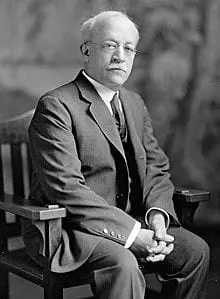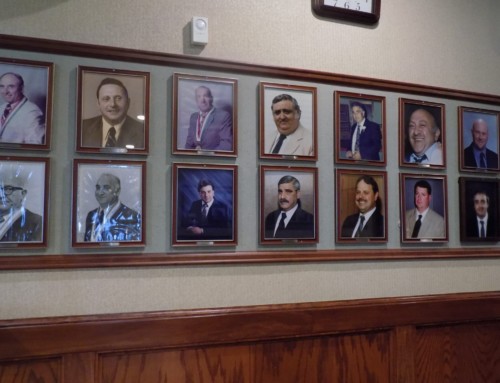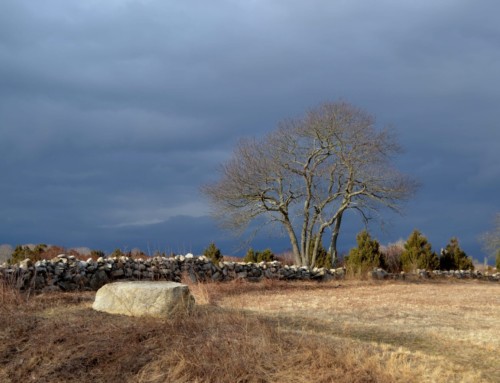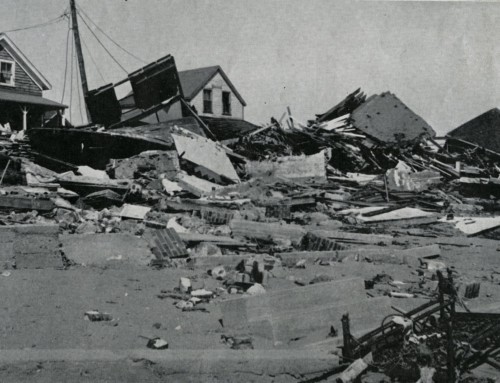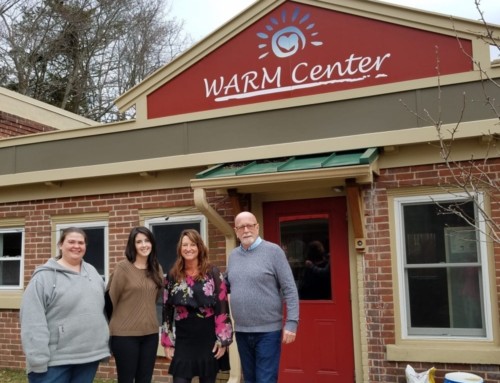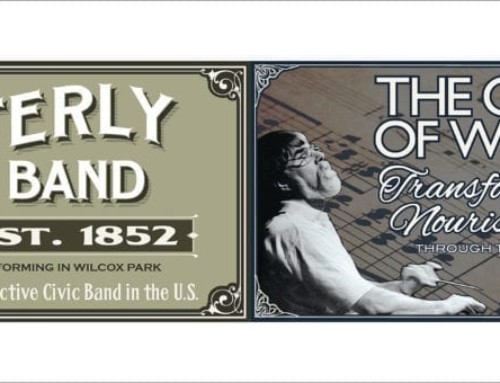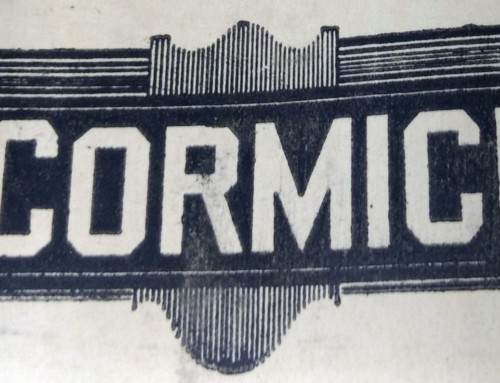The 1890s were a very busy decade for George Herbert Utter, particularly on the political front. In 1891, he was elected to the position of Secretary of State and was re-elected annually for the next four years. In 1894, he stepped down as Secretary of State in response to growing business obligations, likely the result of his father’s death in 1892 and the launch of the Westerly Sun on August 7, 1893.[17] On August 5, 1894, Utter spoke at the dedication of the Westerly Library and Memorial Building, where he celebrated those who risked their lives during the Civil War.[18]
Shortly after this event, on September 30, 1894, George Utter was made a deacon of the Seventh Day Baptist Church of Pawcatuck.[19] He also served as the superintendent of the church’s Sabbath school for 20 years and filled the role of treasurer of the missionary society.[20] In addition to all of the duties already mentioned, George H. Utter added to his commitments by accepting a position on the board of directors for the Washington Trust Bank in 1898.[21]
George H. Utter’s next step on the political ladder in Rhode Island came a decade later in 1904 when he was elected as the state’s lieutenant governor.[22] He served in this position for only one year before he ran for Governor of Rhode Island.[23] On November 8, 1904, Utter narrowly defeated the incumbent, Democrat Lucius F.C. Garvin.[24] Utter received 33,821 total votes (48.94 percent), only 856 votes more than Garvin, or 1.23 percent of the total votes cast.[25] After his first year in office, Utter ran for a second term in 1905. Apparently, the citizens of Rhode Island approved of his job in 1905, as Utter faced Garvin once again and this time, he won by 5,495 votes, a margin more than six times that in 1904.[26]
One of the interesting facets of Utter’s tenure was his practice of abstaining from any gubernatorial work on Saturdays. Whenever work on Saturdays could not be avoided, Governor Utter named Lieutenant-Governor Frederick Jackson as his delegate.[27] This quirk was reported in many newspapers, especially after he sent his lieutenant to Washington D.C. to participate in the inaugural parade of President Theodore Roosevelt in 1905.[28]
In 1906, Utter once again ran for Governor facing off against Democrat James H. Higgins. This time, he came up on the losing end of the election by 1,318 votes.[29] This is the last time Utter would run for Governor as 1907 saw his former Lieutenant, Frederick Jackson receive the Republican nomination.[30] After the 1906 election, George H. Utter would take a brief respite from politics while still operating The Westerly Sun in his adopted hometown. This absence from politics was relatively brief, however.
In November 1910, George H. Utter was elected to serve as the Representative in Congress for Rhode Island’s 2nd District. This term extended from March 4, 1911, to November 3, 1912.[31] In May 1912, Utter contributed an article to The Red Man, the monthly magazine of the Carlisle Indian School in Carlisle, Pennsylvania, and was a guest at the school’s commencement ceremony that year.[32] This article focused heavily on religion, a topic very important to Utter’s life.
In the fall of 1912, Utter campaigned to retain his seat in Congress. However, on November 3, 1912, just two days before the election, George Herbert Utter died at his home in Westerly.[33] On October 26, while in Washington D.C., Utter was taken to the hospital where doctors discovered a malignant tumor on his liver. Upon finding the tumor could not be removed, he was taken to his home in Westerly where he died less than a week later.[34] The tributes to George H. Utter upon his death were both frequent and heartfelt.
On November 6, 1912, his funeral was held in Westerly and local businesses were closed while schools were given a half-day so that all could celebrate his life.[35] In February 1913, at sessions of both the House of Representatives and the Senate, memorial addresses were delivered in Utter’s honor. Although many of these addresses were powerful, perhaps the most poignant words delivered on the floor of the United States Senate describing George H. Utter came from former Governor and then-Senator George P. Wetmore who concluded his address simply: “The world is better for his life.”[36]
[su_accordion class=””] [su_spoiler title=”Footnotes” open=”no” style=”default” icon=”plus” anchor=”” class=””]
[17] George Herbert Utter Memorial Addresses Delivered in the House of Representatives and the Senate of the United States, (Washington, D.C., 1914), pg. 40.
[18] Memorial & Library Association of Westerly, Westerly Library and Wilcox Park: Celebrating 125 Years, (2018), pg. 40.
[19] The First One Hundred Years: Pawcatuck Seventh Day Baptist Church, (Westerly, RI, 1940), pg. 114.
[20] The First One Hundred Years: Pawcatuck Seventh Day Baptist Church, (Westerly, RI, 1940), pg. 135.
[21] Utter Scrapbook, Courtesy of the Westerly Historical Society, Letter to George H. Utter from Charles Perry, 11 January 1910.
[22] George Herbert Utter Memorial Addresses Delivered in the House of Representatives and the Senate of the United States, (Washington, D.C., 1914), pg. 40.
[23] George Herbert Utter Memorial Addresses Delivered in the House of Representatives and the Senate of the United States, (Washington, D.C., 1914), pg. 40.
[24] “1904 Rhode Island Gubernatorial Election” https://en.wikipedia.org/wiki/1904_Rhode_Island_gubernatorial_election
[25] “1904 Rhode Island Gubernatorial Election” https://en.wikipedia.org/wiki/1904_Rhode_Island_gubernatorial_election
[26] “1905 Rhode Island Gubernatorial Election” https://en.wikipedia.org/wiki/1905_Rhode_Island_gubernatorial_election
[27] George Herbert Utter Memorial Addresses Delivered in the House of Representatives and the Senate of the United States, (Washington, D.C., 1914), pg. 10.
[28] New Haven Journal and Courier, 1 April 1905, pg. 4.
[29] “1906 Rhode Island Gubernatorial Election” https://en.wikipedia.org/wiki/1906_Rhode_Island_gubernatorial_election
[30] “1907 Rhode Island Gubernatorial Election” https://en.wikipedia.org/wiki/1907_Rhode_Island_gubernatorial_election
[31]“List of United States Representatives from Rhode Island” https://en.wikipedia.org/wiki/List_of_United_States_Representatives_from_Rhode_Island
[32] Carlisle Indian School, “The Red Man” Vol. 4, No. 9, May 1912. http://carlisleindian.dickinson.edu/publications/red-man-vol-4-no-9
[33] The Sabbath Recorder, 11 November 1912, vol. 73, No. 20, pg. 609.
[34] The Sabbath Recorder, 11 November 1912, vol. 73, No. 20, pg. 609.
[35] George Herbert Utter Memorial Addresses Delivered in the House of Representatives and the Senate of the United States, (Washington, D.C., 1914), pg. 15.
[36] George Herbert Utter Memorial Addresses Delivered in the House of Representatives and the Senate of the United States, (Washington, D.C., 1914), pg. 43.
[/su_spoiler] [/su_accordion]
